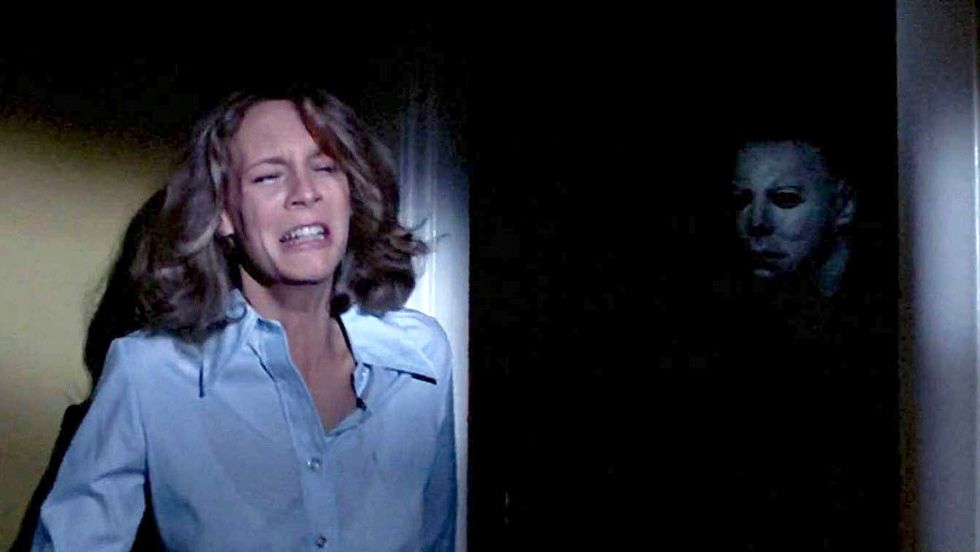Horror loves a reboot. Oh man, horror loooooves a reboot. You’ve heard the names of horror classics like Friday the 13th, A Nightmare on Elm Street, and The Texas Chain Saw Massacre because they are utter classics of the genre—and you’ve had those names re-splashed in your head in the last 20 years because they’ve been so frequently rerun, rebooted, or in some way or another re-established into the public consciousness. Perhaps no franchise in the history of horror has been as successful as Halloween, which started by revolutionizing the genre in 1978 and essentially hasn’t stopped since.
2022’s Halloween Ends, the third and final entry in a trilogy directed by David Gordon Green and starring original star Jamie Lee Curtis, promises to be the ending to a story that’s now been going on for damn near 45 years. And while Halloween Ends may provide an ending, we all know damn well that it’s never the end when we’re talking about Michael Myers (and it’s also never the end when we’re talking about a series of movies that’s making people money).
But we’re not just purely being cynical here—we’re talking as fans of horror movies, as fans of slasher movies, and as informed fans of movies in general. The Halloween series has “come to an end” three times before, and, yet, here we are. Michael Myers and Laurie Strode have lived before, Michael Myers and Laurie Strode have died before, and this vicious cycle may just continue for the rest of our lives.
If you’re a fan of any and everything Halloween, you may have one particular goal in mind: how can I watch them all? They may not connect, but there’s something cathartic about watching Michael Myers lurk in his William Shatner mask, quietly stalking before mowing down unsuspecting victims. The quality of the movies may vary, but if you like slashers, if you like taking an annual trip to Haddonfield, Illinois, this is what you live for.
So, stick with us. Below, we break down the order in which you can watch every Halloween movie ever made—there are now 13—and how you can get all the Laurie and Michael that your heart desires.
The Holy Original
The classic. You must watch this one at all costs.
Halloween (1978)
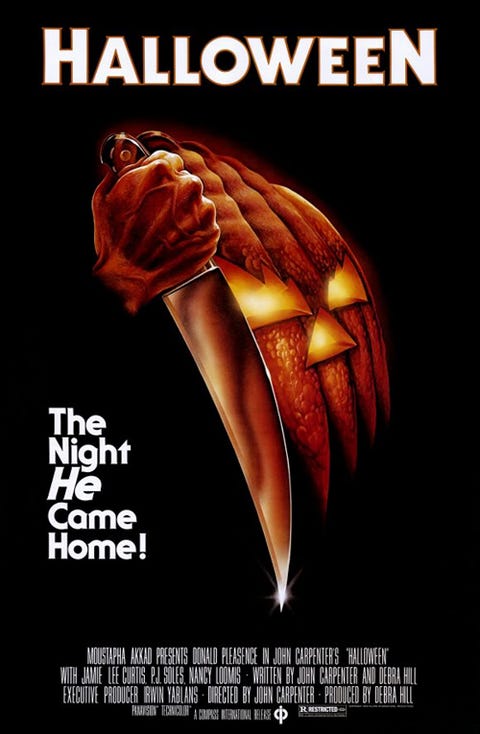
As you’ll see proceeding through this list, there are numerous continuities within the larger Halloween franchise. But—outside of the Rob Zombie remake films, which exist in their own little corner—they all come after the 1978 classic, original, Halloween, directed by John Carpenter. And while a lot of older horror movies don’t tend to stand the test of time, this one 100% does; it’s a classic for a god damn reason.
In the hands of a less capable director, maybe Halloween wouldn’t be as memorable, or as classic, but Carpenter is not a “less capable director”—he’s one of the greats. His decisions to ramp up the tension but also maintain moments of humor where the movie doesn’t take itself too seriously are inspired. This is the movie that made Jamie Lee Curtis a star—and it’s clear why.
The Sequel Trilogy
The three movies in the Halloween sequel trilogy—set 40 years after the original Halloween—aren’t super cohesive, but are well-directed, with a star turn from Jamie Lee Curtis and some gnarly kills.
Halloween (2018)
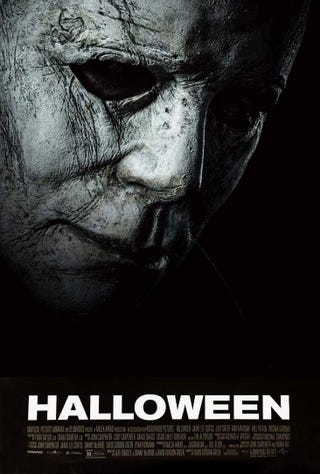
The Halloween sequel trilogy—all three of which are directed by David Gordon Green (The Righteous Gemstones, Pineapple Express) and co-written by Green and his pal Danny McBride—ignores every other movie on this list and picks up things 40 years after the events of the original. The first installment is brilliant; it’s full of modern characters (a doctor, true crime podcasters, etc) trying to put reason and science behind Michael Myers’ evil, while a worn, weary, and utterly-prepared Laurie (a returning Curtis) knows far better. There’s no explanation for evil, and there’s no explanation for Michael Myers—you just have to kill it. Judy Greer and Andi Matichak join the cast as Laurie’s daughter and granddaughter, respectively, and both are great in their roles.
Halloween Kills (2021)
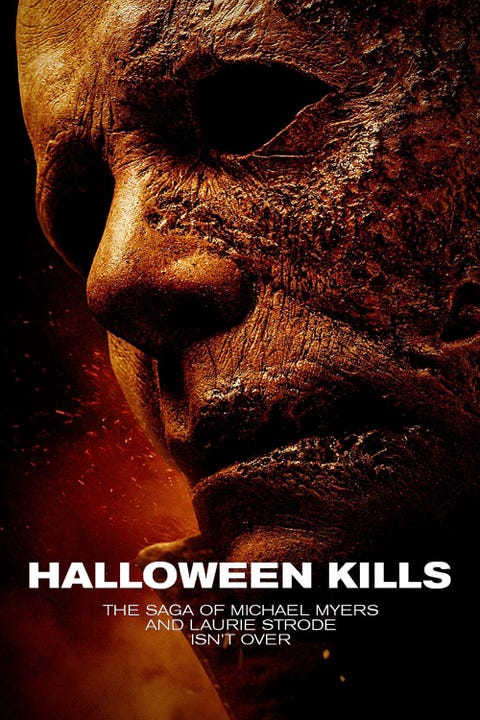
Halloween Kills picks up right when Halloween ends and makes some…strange decisions. Tommy Doyle, a child in the original film, returns as a key character played by Anthony Michael Hall, and he….leads an angry mob. Laurie enters the hospital in the beginning of the movie and never leaves (!?!?!?). Let’s focus on the good: the kills are good! The movie is, once again, directed well. Mostly a misstep, but still fun for fans of the franchise and of slasher films.
Halloween Ends (2022)
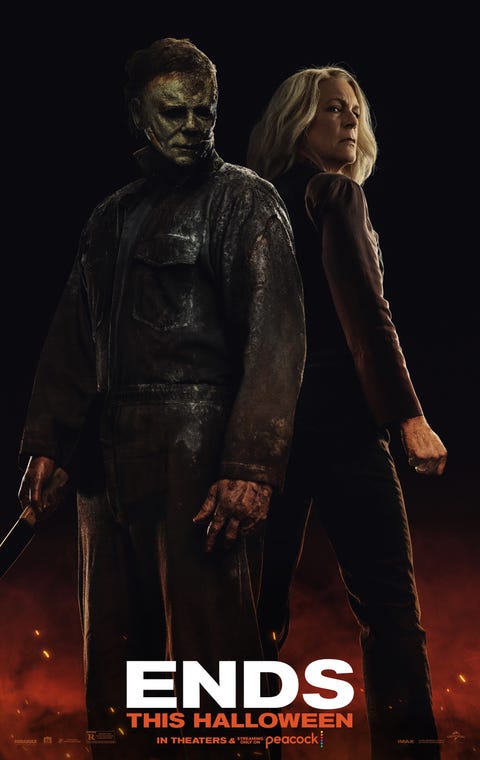
The newest film in the franchise—the final with Jason Blum producing, the final in the sequel trilogy, and possibly the final to star Jamie Lee Curtis—Halloween Ends is an ambitious movie, even for this long-running, much-explored franchise. And while everything in the movie isn’t executed perfectly, the stellar cast, the brutal kills, and Gordon Green’s experienced eye behind the camera make this one of the better sequels in the franchise. And the last 30 minutes or so will have Halloween fans cheering, screaming, and yelling at their TV (I was, at least).
The Original Series
After the original Halloween, five sequels were released. John Carpenter’s original plan was for the Michael Myers story to be over after Halloween II, but after the lukewarm (at best) reaction to the Myers-less Season of the Witch, the iconic villain returned. But the real galaxy-brain take is that Season of the Witch, despite Michael’s absence, is good.
Halloween II (1981)
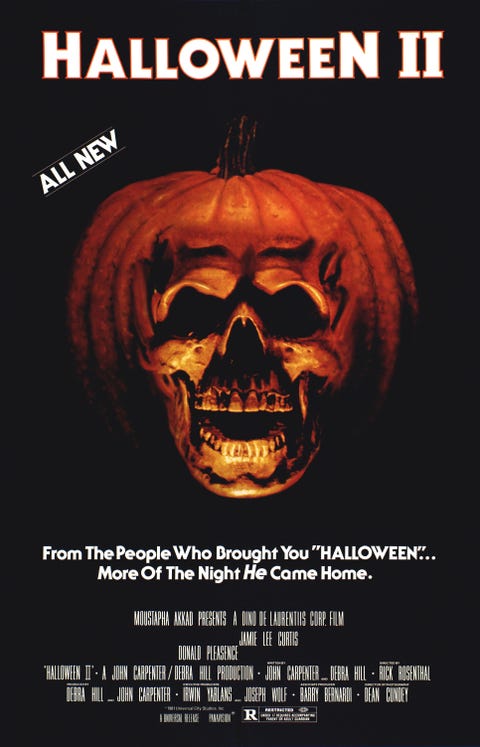
The night Michael Myers returned to Haddonfield continues in Halloween II, which picks up right where the original leaves off. It’s not a classic like the first one, but it’s got some good tension and kills and also some great Michael Myers moments (and also a dude on fire!). Worth watching for any fan. Weirdly, this does have the “Laurie is in the hospital the entire movie” thing in common with Halloween Kills. The biggest reveal here? That Michael and Laurie are actually, drum roll please….siblings.A great choice? Eh! But one the franchise lived with for everything except the sequel trilogy.
Halloween III: Season of the Witch (1982)
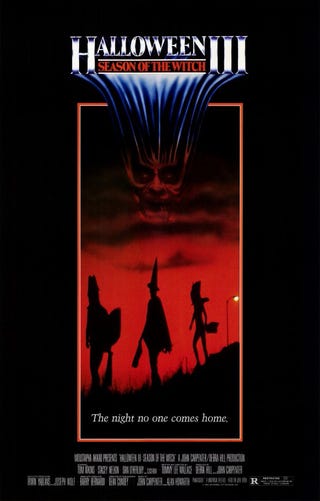
Halloween was originally set to be done with Michael Myers after only those first two movies. Season of the Witch, then, was set to send the franchise in a new, anthology-based direction, where each proceeding film in the series would focus on a different event that went town on Halloween night. This one? Oh, just an evil toy manufacturer trying to sell masks to children that will kill them when they put them on (on Halloween night, of course).
Season of the Witch also, for the first time, brings the supernatural into the franchise; rather than the slasher vibe put forth, this film focuses on witchcraft. It’s become a cult favorite in recent decades, but at the time, the people wanted Michael Myers—and he would later return.
Halloween 4: The Return of Michael Myers (1988)
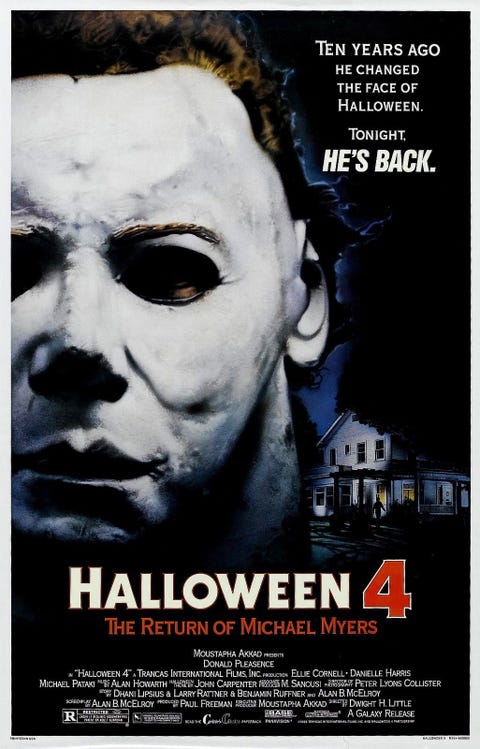
In a decision that should have been punishable with a lengthy incarceration, Halloween 4 reveals that Laurie Strode (Jamie Lee Curtis) has died off-screen between movies, and instead focuses on Laurie’s daughter (and Michael’s niece), a little girl named Jamie Lloyd. Throughout the remainder of the original series, Donald Pleasance really anchors them with some familiarity as Dr. Loomis, as Michael runs around killing people. Not amazing, but if you like watching slashers in October you can do much worse.
Halloween 5: The Revenge of Michael Myers (1989)
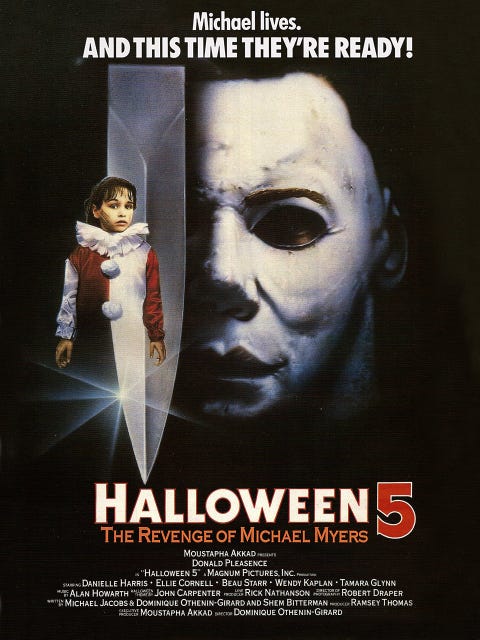
Halloween 5 continues with the Jamie Lloyd era of the franchise, following Laurie’s niece as she attempts to once again evade Michael Myers—and Dr. Loomis as he tries his best to help. It’s….well, it’s kind of more of the same at this point. But it’s Michael Myers!
Halloween: The Curse of Michael Myers (1995)
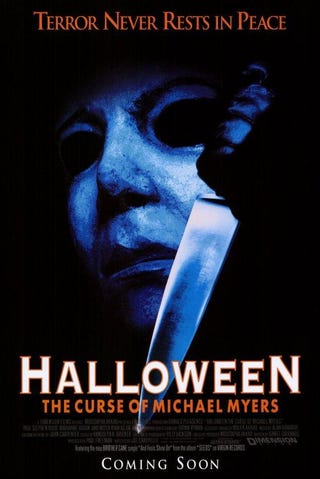
The final film of the original continuity is Halloween: The Curse of Michael Myers, which gets into the supernatural bit of the series and reveals how Michael manages to never freaking die. The plot finds Haddonfield celebrating Halloween for the first time in half a decade, only for Michael to show up with Dr. Loomis, as always, pursuing him. It’s a little goofy, but it completes the Jamie Lloyd era of Halloween, and also features Donald Pleasance’s final film appearance (and stars a guy you may have heard of named Paul Rudd as an older Tommy Doyle).
The Retcon Series
In the late ’90s, a decision was made to ignore the Jamie Lloyd Halloween arc and bring back Jamie Lee Curtis as Laurie. These two films come after both Halloween (1978) and Halloween II (1981)—meaning that Laurie Strode and Michael Myers, in this timeline, are siblings.
Halloween H20: 20 Years Later (1998)
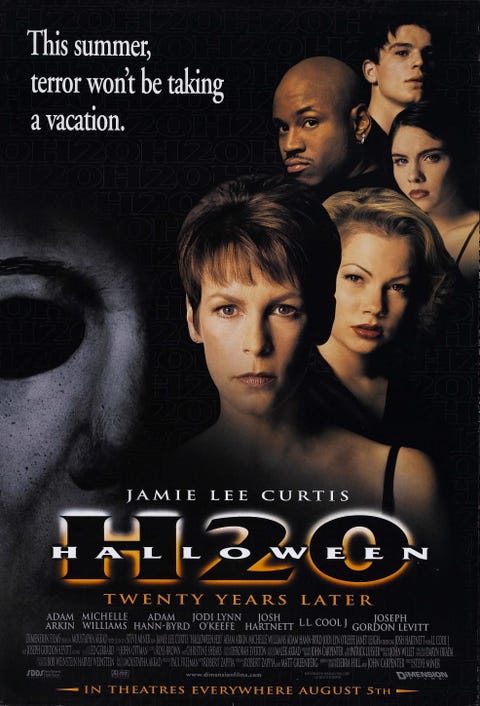
H20 is considered by many to be the best sequel in the Halloween franchise. Picking up 20 years later in the late ’90s (and based on a story originally pitched by Scream and I Know What You Did Last Summer scribe Kevin Williamson), H20 gives Halloween fans what they wanted: more Laurie Strode. Michael is at it again, finding Laurie in her new quiet life: teaching at a boarding school.
Halloween: Resurrection (2002)
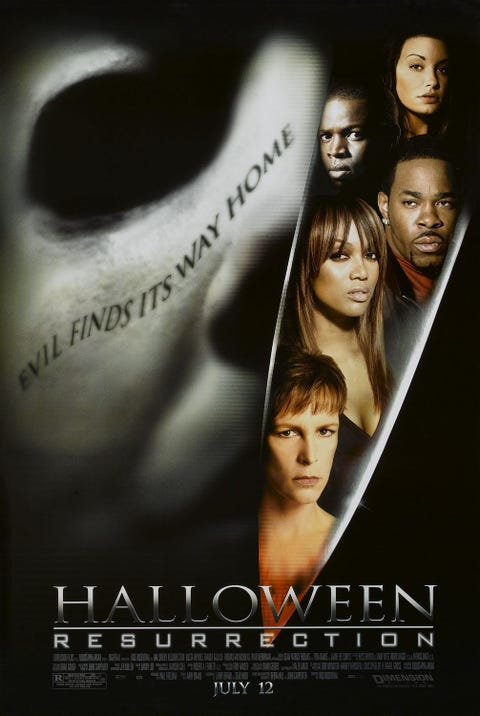
A few years after H20, a sequel, Resurrection came. With only a 12% on Rotten Tomatoes, it’s not surprising that the franchise lost some steam after this one. If you’re a loyalist, probably worth checking out, because why not? John Carpenter talked about Resurrection while promoting the 2018 film. “I watched the one in that house, with all the cameras. Oh my god,” he said. “Oh lord, god. And then the guy gives the speech at the end about violence. What the hell? Oh my lord. I couldn’t believe.”
The Remakes
Halloween (2007)
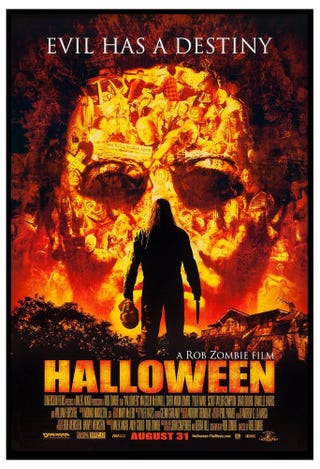
Music star and horror fanatic Rob Zombie (who had already directed movies like House of 1000 Corpses) took a stab at the Halloween franchise in 2007, when he directed a reboot/remake of the franchise with an all new cast. Scout Taylor-Compton plays Laurie, and Malcolm McDowell plays Dr. Loomis, but of whom aren’t half bad. But his real diversion from the original comes in the attempts to develop Michael in his youth, a big difference from the original trilogy that just showed us murdering his sister.
Halloween II (2009)
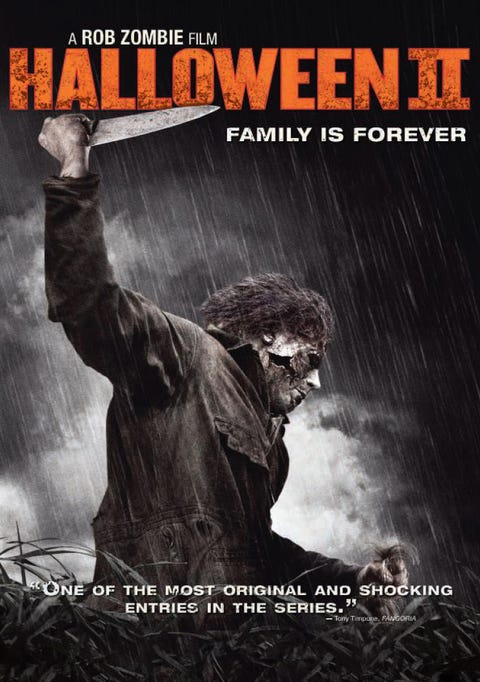
Zombie got another go at it in 2009 with a direct sequel to his 2007 remake. This movie has a cult following, but John Carpenter himself is neither a fan of the remake nor its sequels.
Evan is the culture editor for Men’s Health, with bylines in The New York Times, MTV News, Brooklyn Magazine, and VICE. He loves weird movies, watches too much TV, and listens to music more often than he doesn’t.


